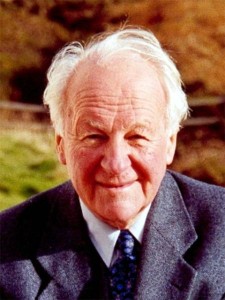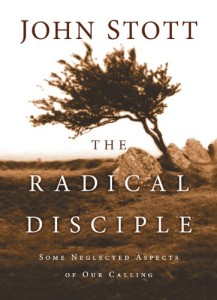
It’s coming. . . I know it is. And no matter how much I might try to ignore it or convince myself otherwise, my own death will someday visit my life. I was reminded of this again this morning when I walked out to the end of the driveway to pick up the newspaper. There at the top of the front page was a large headline telling me that 5 motorcyclists were killed here yesterday after colliding with a van.
I mention this not to be morbid, but to be truthful. I also mention it because I have just finished reading John Stott’s wonderful little book, The Radical Disciple: Some Neglected Aspects Of Our Calling. The book is the 88-year-old Stott’s farewell address to the church he so dearly loves. It’s the last book this great theologian and prolific writer will ever pen. He’s aware that his earthly physical death is imminent. In the book, Stott masterfully outlines eight characteristics of Christian discipleship that are often neglected in the contemporary church, yet deserve to be taken seriously.

The first seven characteristics are for the most part things that we might expect to be on the list: nonconformity, Christlikeness, maturity, creation care, simplicity, balance, and dependence. But then there’s the eighth: death. Death?!? Isn’t Christianity about life. . . eternal life?
Once again, John Stott (my favorite living theologian) has challenged me to think about the things that really matter, to gain a Biblical perspective, and to live my life in light of the things that are good, true, right and honorable. It’s no coincidence that the last few words penned by the man who has penned so many words about the faith would be reminders to himself of what is imminent in his own life. He writes, “Christianity offers life – eternal life, life to the full. But it makes it plain that the road to life is death. . . Life through death is one of the profoundest paradoxes in both the Christian faith and the Christian life.”
Stott then goes on to describe six areas in which this is true.
There’s death in our salvation. Christ died in our place so that we might have life.
There’s death in discipleship. As Christ’s followers, we are called to take up our cross and die to ourselves.
There’s death in mission. “People receive life through the Gospel, and those who preach the Gospel faithfully suffer for it.”
There’s death in persecution. The history of the church is filled with accounts of physical persecution being the avenue to life.
There’s death in martyrdom. Perhaps you are familiar with the story of Romanian pastor Josef Ton, who told in one of his sermons how the authorities threatened to kill him because of his faith. Ton responded, “Sir, your supreme weapon is killing. My supreme weapon is dying.”
Finally, there’s death in mortality. For the Christian – John Stott included – the best is yet to come.
These are the realities we must contemplate and communicate. They bring great joy, great hope, and great assurance. They prepare us for what is to come.
I have found Stott’s The Radical Disciple to be a short, easy-to-read, and challenging reminder that in a world filled with distractions, has centered me back on to some of the things that really matter. With only a week gone in the summer, I would challenge you to give this little book your time and attention. It’s the book I’m choosing to recommend as the “summer read for 2010.” You can order your copy here.
This was an interesting perspective on death and the churches. I’m a Catholic youth minister and death is a persistent pastoral issue. When doing outreach to kids, the question “what happens when we die” brings surprising answers. Lately, I’ve encountered more unchurched teenagers who feel they’re standing at the edge of oblivion. The desire to pursue the truth is minimal and the loss of hope is frightening.
The message of the cross is that Christ gains enternal life for us through his suffering, death, and resurrection. But to follow Jesus in faith means that we must travel on His road, from death to eternal life. Death is very very real. Remembering our death (as opposed to obsessing about it) is a real opportunity to gain eternal perspective.